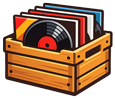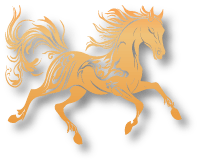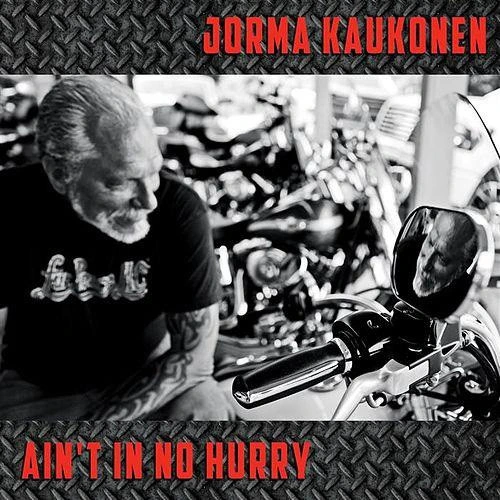This disc will ONLY work on a Super Audio Disc Player!
An exploration of a little known chapter in American music history, Blue Country Heart reveals a new turn in Kaukonen's ever-evolving career. A collection of rural blues songs from the 1920s and 1930--written mostly by white tunesmiths including Jimmie Rodgers ("The Singing Brakeman"), the Delmore Brothers, Larry Hensley, Washington Phillips, Cliff Carlisle and Jimmie "The Singing Governor" Davis--Blue Country Heart will be in stores Tuesday, June 11.
Joining Jorma in the studio are Sam Bush on mandolin, Jerry Douglas on dobro and Byron House on upright bass. Special guest (and Columbia labelmate) Bela Fleck plays banjo on two tracks.
As a charter member of Jefferson Airplane and the equally legendary (and still active) Hot Tuna, Jorma's playing has always been steeped in the music of such Delta blues legends as Robert Johnson and Mississippi Fred McDowell and, most importantly, the Piedmont style gospel player Rev. Gary Davis, whose songs Kaukonen has reintroduced to a new generation of appreciative fans. On Blue Country Heart, Jorma engages the tradition of early country music.
"When I started out playing the guitar I was playing a lot of old-timey music and what passed for bluegrass in the '50s," says the Rock & Roll Hall of Famer. "It's not really blues in the traditional blues sense," Kaukonen explains, "although that's pretty much where I am coming from as a player. There is a bluegrass flavor to it because of the guys involved in the sessions, but it's not bluegrass in a strict, traditional sense either. It's a lot of this singer-songwriter stuff from the Depression era that has stuck with us over time." Perhaps the difficulty in categorizing this music speaks to its roots. These songs offer a timely look at how black and white people, especially musicians, were actively intermixing at a time when racial segregation was still very much in force and would be for decades to come.
The common thread running through all of this early American material is that the tunes invariably combine memorable melodies and straightforward storytelling. "Stylistically it's very eclectic stuff but the tunes really register with people in the way that great folk songs do," says Kaukonen. "A lot of these tunes are just part of our cultural subconscious as Americans. Like Jimmie Davis' 'You Are My Sunshine.' Now that's a song that most people know because it's been passed down through the generations, but probably not too many people know that it was written by the former 'Singing Governor of Louisiana.' That's a bit of trivia that escapes most people but the tune has stayed with us."
"Of course, I knew the stuff by Jimmie Davis ("Red River Blues") and Jimmy Rodgers ("Waitin' for a Train," "These Gambler's Blues," "I'm Free From The Chain Gang Now" and "You and My Old Guitar,"), says Kaukonen, "but others I wasn't familiar with, like The Shelton Brothers and Slim Smith. I had heard of the Delmore Brothers because they're supposedly the vocal precursors to the Everly Brothers but I never was really familiar with their material. Washington Phillips ("What Are They Doing In Heaven Today") is someone who (fellow guitarist) G.E. Smith turned me on to last year, although I had heard some of his stuff before. He played an odd-sounding instrument called the dulceola, which is a cross between a zither and an autoharp, and I always thought, 'Man, what is that thing he's playing?' So I ended up performing old favorites as well as learning a bunch of cool tunesfor this project. It was an educational experience as well as a personal pleasure."
Tunes like Jimmie Rodgers' "These Gambler's Blues" and "Waiting For A Train" and the Delmore Brothers' "Blues Stay Away From Me" exude a casual back porch jam aesthetic while invigorating vehicles like Jimmie Davis' "Red River Blues," the Delmore Brothers' "Big River Blues" and Cliff Carlisle's "Tomcat Blues" showcase the instrumental virtuosity of all the players on this all-star session.
A natural storytelling quality permeates all the material and in some cases carries a decidedly political point of view. "Prohibition Blues" speaks in biting terms of the government's futile efforts to enforce the 18th Amendment forbidding the manufacture and sale of liquor from 1920 to 1933: "Prohibition has killed more folks than Sherman ever seen/If they don't get whisky they'll take to dope, cocaine and morphine/This ol' country it sure ain't dry and dry will never be seen/Prohibition is just a scheme, a fine money-making machine."
Similar political commentary comes on Slim Smith's "Breadline Blues," a Depression era anthem whose sprightly bounce belies the pointed content of it's lyrics: "All of us good folks are in distress and I'm gonna get something off my chest/1932 won't be long when you place your votes please don't vote wrong/vote away the blues, the breadline blues/It's a rich man's job to make some rules in order to rid my breadline blues/Now listen here folks and it ain't no joke we gotta do something or we're all gonna croak/Can't get a job, we've all been robbed/Ain't got no money and the corn's all cob."
Elsewhere on Blue Country Heart, Jorma sings sweetly on Jimmie Rodgers' hymn-like ode to his lifelong companion, "You and My Old Guitar," strikes a poignant note on Washington Phillips' reflective ballad, "What Are They Doing In Heaven Today," and barrels his way through a spirited bluegrass rendition of The Shelton Brothers' "Just Because," which features some sizzling exchanges between Bela Fleck's old-time banjo licks and Jerry Douglas' sliding dobro.
The Blue Country Heart sessions took place at the famed Masterlink studio, the site of seminal recordings by the likes of Waylon Jennings and Dolly Parton. "We did 16 songs in four days," says Kaukonen. "The studio has one of those Nashville histories. They had fabulous equipment, the room is real beautiful sounding and everything we did was completely acoustic. I used my 1936 Advanced Jumbo Gibson and Sam had some mandolin from the '20s. Lord knows what Jerry had, there was a huge battery of vintage dobros on hand for the sessions. Byron was playing a standup bass that was over 100 years old and Bela came in with a banjo from the late '30s. So we had a bunch of vintage acoustic instruments and we just went in and set up, got comfortable in the room and played. And I never wore headphones once during the session. It was just like sitting and playing at home."
The relaxed down-home feel of the sessions has been beautifully captured in direct stream digital Super Audio CD (SACD) by producer Roger Moutenot. The disc is one of only a handful of recordings currently on the marketoriginally recorded with this advanced technology, an extension of the compact disc format which delivers the finest sound reproduction available. "The beauty of Super Audio CD is that it enables you to hear the totality of the performance captured during the recording process," explained Leslie C. Cohen, Vice President, Business Development for Sony Music Entertainment. "The sound is absolutely clear, and the impact is visceral -- it brings the listener that much closer to the intent of the artist while rekindling that sense of excitement and wonder you felt hearing your first live performance."
You can feel that sense of immediacy and warmth on every track of Blue Country Heart. "I've always wanted to do an old-timey traditional record with some of my old Nashville pals," says Kaukonen. Blue Country Heart is really a dream come true."
Musicians: Jorma Kaukonen, guitar & vocal; Sam Bush, mandolin, fiddle & background vocals; Jerry Douglas, dobro & weissenborn; Byron House, bass & background vocals; Bela Fleck, banjo.
Selections:
1. Blue Railroad Train
2. Just Because
3. Blues Stay Away From Me
4. Red River Blues
5. Bread Line Blues
6. Waiting For A Train
7. Those Gambler's Blues
8. Tom Cat Blues
9. Big River Blues
10. Prohibition Blues
11. I'm Free From The Chain Gang Now
12. You And My Old Guitar
13. What Are They Doing In Heaven Today?
An exploration of a little known chapter in American music history, Blue Country Heart reveals a new turn in Kaukonen's ever-evolving career. A collection of rural blues songs from the 1920s and 1930--written mostly by white tunesmiths including Jimmie Rodgers ("The Singing Brakeman"), the Delmore Brothers, Larry Hensley, Washington Phillips, Cliff Carlisle and Jimmie "The Singing Governor" Davis--Blue Country Heart will be in stores Tuesday, June 11.
Joining Jorma in the studio are Sam Bush on mandolin, Jerry Douglas on dobro and Byron House on upright bass. Special guest (and Columbia labelmate) Bela Fleck plays banjo on two tracks.
As a charter member of Jefferson Airplane and the equally legendary (and still active) Hot Tuna, Jorma's playing has always been steeped in the music of such Delta blues legends as Robert Johnson and Mississippi Fred McDowell and, most importantly, the Piedmont style gospel player Rev. Gary Davis, whose songs Kaukonen has reintroduced to a new generation of appreciative fans. On Blue Country Heart, Jorma engages the tradition of early country music.
"When I started out playing the guitar I was playing a lot of old-timey music and what passed for bluegrass in the '50s," says the Rock & Roll Hall of Famer. "It's not really blues in the traditional blues sense," Kaukonen explains, "although that's pretty much where I am coming from as a player. There is a bluegrass flavor to it because of the guys involved in the sessions, but it's not bluegrass in a strict, traditional sense either. It's a lot of this singer-songwriter stuff from the Depression era that has stuck with us over time." Perhaps the difficulty in categorizing this music speaks to its roots. These songs offer a timely look at how black and white people, especially musicians, were actively intermixing at a time when racial segregation was still very much in force and would be for decades to come.
The common thread running through all of this early American material is that the tunes invariably combine memorable melodies and straightforward storytelling. "Stylistically it's very eclectic stuff but the tunes really register with people in the way that great folk songs do," says Kaukonen. "A lot of these tunes are just part of our cultural subconscious as Americans. Like Jimmie Davis' 'You Are My Sunshine.' Now that's a song that most people know because it's been passed down through the generations, but probably not too many people know that it was written by the former 'Singing Governor of Louisiana.' That's a bit of trivia that escapes most people but the tune has stayed with us."
"Of course, I knew the stuff by Jimmie Davis ("Red River Blues") and Jimmy Rodgers ("Waitin' for a Train," "These Gambler's Blues," "I'm Free From The Chain Gang Now" and "You and My Old Guitar,"), says Kaukonen, "but others I wasn't familiar with, like The Shelton Brothers and Slim Smith. I had heard of the Delmore Brothers because they're supposedly the vocal precursors to the Everly Brothers but I never was really familiar with their material. Washington Phillips ("What Are They Doing In Heaven Today") is someone who (fellow guitarist) G.E. Smith turned me on to last year, although I had heard some of his stuff before. He played an odd-sounding instrument called the dulceola, which is a cross between a zither and an autoharp, and I always thought, 'Man, what is that thing he's playing?' So I ended up performing old favorites as well as learning a bunch of cool tunesfor this project. It was an educational experience as well as a personal pleasure."
Tunes like Jimmie Rodgers' "These Gambler's Blues" and "Waiting For A Train" and the Delmore Brothers' "Blues Stay Away From Me" exude a casual back porch jam aesthetic while invigorating vehicles like Jimmie Davis' "Red River Blues," the Delmore Brothers' "Big River Blues" and Cliff Carlisle's "Tomcat Blues" showcase the instrumental virtuosity of all the players on this all-star session.
A natural storytelling quality permeates all the material and in some cases carries a decidedly political point of view. "Prohibition Blues" speaks in biting terms of the government's futile efforts to enforce the 18th Amendment forbidding the manufacture and sale of liquor from 1920 to 1933: "Prohibition has killed more folks than Sherman ever seen/If they don't get whisky they'll take to dope, cocaine and morphine/This ol' country it sure ain't dry and dry will never be seen/Prohibition is just a scheme, a fine money-making machine."
Similar political commentary comes on Slim Smith's "Breadline Blues," a Depression era anthem whose sprightly bounce belies the pointed content of it's lyrics: "All of us good folks are in distress and I'm gonna get something off my chest/1932 won't be long when you place your votes please don't vote wrong/vote away the blues, the breadline blues/It's a rich man's job to make some rules in order to rid my breadline blues/Now listen here folks and it ain't no joke we gotta do something or we're all gonna croak/Can't get a job, we've all been robbed/Ain't got no money and the corn's all cob."
Elsewhere on Blue Country Heart, Jorma sings sweetly on Jimmie Rodgers' hymn-like ode to his lifelong companion, "You and My Old Guitar," strikes a poignant note on Washington Phillips' reflective ballad, "What Are They Doing In Heaven Today," and barrels his way through a spirited bluegrass rendition of The Shelton Brothers' "Just Because," which features some sizzling exchanges between Bela Fleck's old-time banjo licks and Jerry Douglas' sliding dobro.
The Blue Country Heart sessions took place at the famed Masterlink studio, the site of seminal recordings by the likes of Waylon Jennings and Dolly Parton. "We did 16 songs in four days," says Kaukonen. "The studio has one of those Nashville histories. They had fabulous equipment, the room is real beautiful sounding and everything we did was completely acoustic. I used my 1936 Advanced Jumbo Gibson and Sam had some mandolin from the '20s. Lord knows what Jerry had, there was a huge battery of vintage dobros on hand for the sessions. Byron was playing a standup bass that was over 100 years old and Bela came in with a banjo from the late '30s. So we had a bunch of vintage acoustic instruments and we just went in and set up, got comfortable in the room and played. And I never wore headphones once during the session. It was just like sitting and playing at home."
The relaxed down-home feel of the sessions has been beautifully captured in direct stream digital Super Audio CD (SACD) by producer Roger Moutenot. The disc is one of only a handful of recordings currently on the marketoriginally recorded with this advanced technology, an extension of the compact disc format which delivers the finest sound reproduction available. "The beauty of Super Audio CD is that it enables you to hear the totality of the performance captured during the recording process," explained Leslie C. Cohen, Vice President, Business Development for Sony Music Entertainment. "The sound is absolutely clear, and the impact is visceral -- it brings the listener that much closer to the intent of the artist while rekindling that sense of excitement and wonder you felt hearing your first live performance."
You can feel that sense of immediacy and warmth on every track of Blue Country Heart. "I've always wanted to do an old-timey traditional record with some of my old Nashville pals," says Kaukonen. Blue Country Heart is really a dream come true."
Musicians: Jorma Kaukonen, guitar & vocal; Sam Bush, mandolin, fiddle & background vocals; Jerry Douglas, dobro & weissenborn; Byron House, bass & background vocals; Bela Fleck, banjo.
Selections:
1. Blue Railroad Train
2. Just Because
3. Blues Stay Away From Me
4. Red River Blues
5. Bread Line Blues
6. Waiting For A Train
7. Those Gambler's Blues
8. Tom Cat Blues
9. Big River Blues
10. Prohibition Blues
11. I'm Free From The Chain Gang Now
12. You And My Old Guitar
13. What Are They Doing In Heaven Today?




 Turntable Accessories
Turntable Accessories Headphone Accessories
Headphone Accessories Cable Accessories
Cable Accessories Vinyl Accessories
Vinyl Accessories Compact Disc Accessories
Compact Disc Accessories







